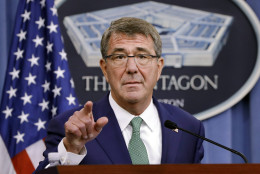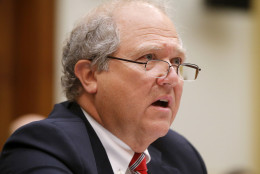Afghanistan
-
The White House wants nearly $12 billion to keep extra troops in Afghanistan and to continue the fight against the Islamic State. Some members of Congress think the request isn't enough.
November 11, 2016 -
DHS leaders say the public and private sector now more than ever need to work together to protect the country's critical infrastructure and cyber systems.
June 21, 2016 -
The Pentagon and the IG charged with Afghanistan reconstruction oversight sparred Wednesday over alleged obstructions to the IG's probe into a controversial reconstruction program.
January 21, 2016 -
What if you\'re paying a fixed price for services, but the contractor starts to fall down on the job? That\'s what happened to the Army in Afghanistan. It hired a company called Mansoor International to provide trucking. Mansoor was paid a fixed price for each trip, but then things started to go wrong. Joe Petrillo, a partner at the law firm Petrillo and Powell, joined Tom Temin on the Federal Drive for more on the case and the lessons learned we turn to procurement attorney Joe Petrillo, a partner at the law firm Petrillo and Powell.
June 11, 2015 -
A former FBI agent accused of trying to derail a Utah investigation into an alleged defense contractor kickback scheme was sentenced to 10 years in prison Monday.
March 30, 2015 -
Defense spending would get a 7.7 percent boost in 2016 under President Obama's proposed budget. Officials say the department is still feeling the disruption of reduced spending and sequestration cuts from recent years. The 2016 proposal includes funding for a broad range of weapons systems, missile defense and a 1.3 percent raise for service members and department civilians. Lt. Gen. Dave Barno (Ret.) was a senior American commander of U.S. and coalition forces in Afghanistan, and is now with American University. He joined Tom Temin on the Federal Drive with more analysis.
February 03, 2015 -
The main U.S. foreign assistance agency on Monday suspended awards to a non-governmental organization that has received more than $1 billion for its work in Afghanistan and Iraq the past nine years.
January 26, 2015 -
The war in Afghanistan and the 9/11 terrorist attacks are the two best recent examples of asymmetric warfare, according to the RAND Corporation. So now it's looking at the last 13 years to see how U.S. military strategy evolved, and to see if it offers clues on how best to change it in the future. Linda Robinson is senior international policy analyst at the RAND Corporation. She offered extensive analysis on In Depth with Francis Rose.
December 17, 2014 -
Most of the troops are coming home, but that doesn't mean there isn't still work to do in Afghanistan. Every year, the Special Inspector General for Afghanistan Reconstruction (SIGAR) assembles a "high risk" list. It outlines which areas of the reconstruction effort are most vulnerable to waste, fraud and abuse. The list also helps the armed services focus their reconstruction efforts and correct problems. Deputy SIGAR Gene Aloise joined Tom Temin on the Federal Drive to discuss this year's findings and their implications.
December 17, 2014 -
On this week's On DoD, John Sopko, Special Inspector General for Afghanistan Reconstruction, says the role of an IG is to effectuate change. In his words, "If it's worth publishing, it's worth publicizing."
October 01, 2014 -
Robert Work, the new deputy defense secretary, told members of the House Armed Services Committee that the Defense Department will experience a two-year trough in readiness as it resets its force,
July 16, 2014 -
Sean C. Young and Benjamin J. Tran, two electronics engineers with the Air Force Research Lab created an aerial sensor that has helped U.S. service members to find and destroy dangerous improvised explosive devices (IEDs) in Afghanistan.
July 07, 2014 -
How has USAID sought to promote stability and order in Afghanistan? What is USAID's three-fold transition strategy? Join host Michael Keegan as he explores these questions and more with Larry Sampler, Assistant to the Administrator & Director, Office of Afghanistan and Pakistan Affairs, USAID.
June 06, 2014 -
Former contract employee was charged with allegedly defrauding the United States in connection with a contract to provide reconstruction-related services in Afghanistan.
May 29, 2014 -
As the United States prepares to leave Afghanistan, officials want to make sure the Middle Eastern nation's economy has a fighting chance. The Defense Department and the U.S. Geological Survey have teamed up to provide Afghanistan investors with maps showing where extraction wealth might be located. For more on this program we turn to the head of the Mineral Resources Program at U-S-G-S, Larry Meinert, mineral resources program coordinator at U.S.G.S, explained on the Federal Drive how the mapping will go.
March 28, 2014










